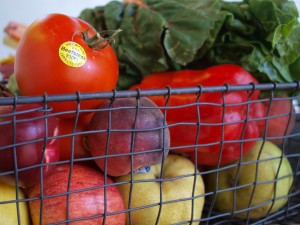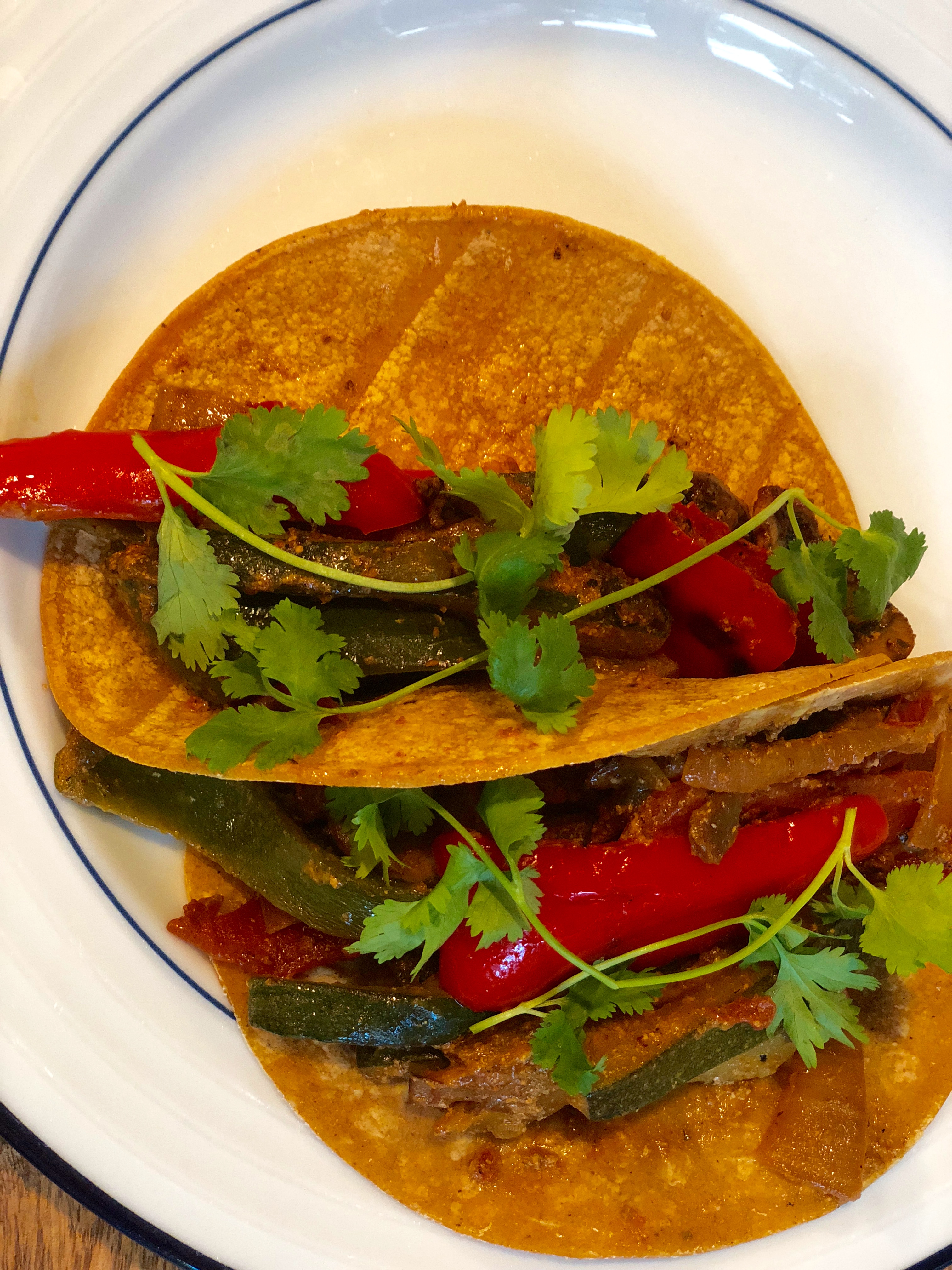Or, how not to waste all that beautiful local produce you couldn’t resist at the farmer’s market.
 I love going to the farmer’s market this time of year. Not only is it a fun destination for a family bike ride and weekend breakfast, but of course there’s all this amazing fresh food everywhere just beckoning for me to buy it. I often buy so much that when I get it home, it doesn’t even fit in my produce bins…and then we’ll have a few days of not eating at home because, well, it’s summer…and if I’m not careful, the next thing I know, that gorgeous organic (and not cheap) kale and those perfect tomatoes have become flabby, mushy, and pathetic. Almost nothing irks me more than letting food go to waste — especially food that was grown by a local farmer and carried home in my bike basket (uphill, I might add).
I love going to the farmer’s market this time of year. Not only is it a fun destination for a family bike ride and weekend breakfast, but of course there’s all this amazing fresh food everywhere just beckoning for me to buy it. I often buy so much that when I get it home, it doesn’t even fit in my produce bins…and then we’ll have a few days of not eating at home because, well, it’s summer…and if I’m not careful, the next thing I know, that gorgeous organic (and not cheap) kale and those perfect tomatoes have become flabby, mushy, and pathetic. Almost nothing irks me more than letting food go to waste — especially food that was grown by a local farmer and carried home in my bike basket (uphill, I might add).
So, I came up with a few strategies for dealing with those heaping piles of fresh fruits and veggies. These have really helped me, and I hope they help you, too.
1) Have a plan. Or at least he very faintest sketchy outline of a plan. I know my last post scoffed at the idea of summertime meal planning, but I do think you need to have some concept of when you might eat those endives and with what. It’s kind of like shopping for clothes and asking yourself, what will I wear it with? If you do go without at plan, say to buy lots of tomatoes and basil for Summer Tomato Sauce, then ask the farmer if he or she has any suggestions.
2) Prep it. I know this means work. And I know you’d really rather put the stuff away and deal with it later. But you’ll be so happy once the carrots are peeled and the lettuces are washed. And you’ll be a lot more likely to eat them, too. Really.
3) Store it properly. I recently clipped an article on food storage in Real Simple, which I keep on the bulletin board in my kitchen. I refer to it all the time, and it’s amazing how not intuitive food-storage is (i.e. apples should be stored in the fridge, tomatoes on the counter). To that I would add making sure you have the right kind of containers and bags, although I’m not the best example on this front. Some people swear by Debbie Meyer Green Bags. I usually just wrap things in paper towels and then store in the bag from the market.
4) Get busy eating. Even if you have no plan or knowledge of food storage, you know that a pint of fresh strawberries won’t keep for more than a few days. So, instead of a bowl of popcorn or granola bar for a snack, eat those berries. Same goes for cucumber slices, carrots (especially since you already prepped them, right?), and sugar snap peas. Eat the foods that spoil quickest right away while you wait for the peaches to ripen.
5) Make stir-fries and salads. Just about anything you can buy at the farmer’s market can be tossed into a hot wok or skillet, and if not, it can probably be added to a salad. Pretty much every night we eat at home involves some version of stir-fried veggies or a fruit-laden salad. Sometimes both. This recipe I posted a year ago is a perfect (and tasty) example, but don’t be afraid to experiment and have fun; you’ll be amazed at the delicious combinations you’ll come up with, and besides, a veggie dish that turns out less than perfect is still much better than a compost bin full of expensive produce.
6) Roast. I’ve recently become fanatical about roasted veggies. Roasting takes fruits and vegetables to the next level and makes them taste almost indulgent; plus, I think it buys you a few more days before you eat them (although I have nothing beyond my experience to prove this). The other day I roasted some beets, then cut them up and mixed them into a spinach salad the next day, and they tasted amazing. Roasted tomatoes taste like candy. Roasted peaches, apricots, plums, and nectarines make a delicious ice cream topping, and roasted green beans are a great finger food.
7) Freeze. If you you realize there’s no way you’re going to eat those green beans, just freeze them. Almost any fruit or vegetable can be frozen, although most veggies should be blanched briefly first. Here is a super helpful guide to freezing almost anything.
8) Invite your friends over. Whenever the kitchen starts to burst at the seems, we like to throw ad hoc dinner parties. In the summer, that means calling a few people, thawing out a piece of fish or some ground meat (which also probably needs to be eaten sooner than later), and making a bunch of different salads and veggie trays. Don’t tell my friends, but by letting us feed them, they’re really doing us a favor.
9) Don’t feel guilty. Okay you bought too many vegetables. Last time I checked, that’s not a crime.


